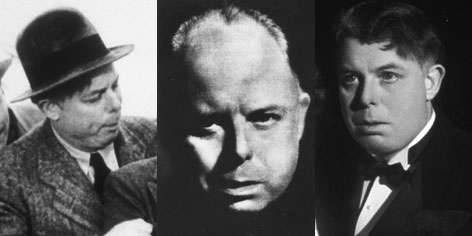Year: 1960
As a Golden Gate Awards jury member at the 4th San Francisco International Film Festival, Renoir spoke out for--and against--art as commerce.
GREAT MOMENTS
JEAN RENOIR: THERE IS MYSTERY IN THE SOUL OF THE ARTIST

By Miguel Pendás
In a very personal sense, Jean Renoir was a key inspiration to great figures in the humanist film tradition like Satyajit Ray (his assistant on The River) and François Truffaut, and films like Grand Illusion, Rules of the Game and The River continue to inspire filmmakers even today. From the realist Toni to the wild musical French Can Can to the politically charged The Crime of Monsieur Lange, he seemed to bridge universes. He is arguably the greatest artist the cinema has ever known.
Renoir, like so many others, left Europe during World War II and worked in America from 1941 to 1947. And thus, this typically French filmmaker became a Hollywood director. Although he was criticized for it, it was an decision he never regretted.
In 1960, near the end of his filmmaking career, Renoir was invited to serve on the Golden Gate Awards jury for the Fourth San Francisco International Film Festival. Renoir was a great choice for it would be hard to find a more thoughtful and articulate observer of the film scene. He had firm opinions while being, as biographer and critic Penelope Gilliatt put it, “supremely undogmatic.”
On the eve of Opening Night, the Festival took advantage of his presence, as well as of several other illustrious jury members, to schedule a panel discussion titled “The Role of Films in International Cultural Relations.” Other panelists included Soviet director Grigori Chukhrai, whose Ballad of a Soldier had won Best Film and Best Director at the Festival the year before (he had also been nominated for an Oscar for Best Story and Screenplay written directly for the screen) and Hollywood director Edward Dmytryk (The Young Lions, The Caine Mutiny). Dmytryk had become notorious several years earlier, first as a one of the blacklist victims, the Hollywood Ten, then as a turncoat who named names for the withchhunters to get out of jail.
Quickly the discussion turned to art versus commerce, and perhaps the audience expected sparks to fly. After all, for the first three years of its tenuous existence, the Festival had quixotically upheld the banner of film as art against the indifference of the film-as-commerce forces. Not only that, but you had to wonder, Will the Cold War get hot onstage?
Chukhrai began by explaining, “In Russia we do not make pictures to make money. Our directors absorb many of the functions of the producer. We work with an art committee which makes many decisions and many recommendations. However, the director does his own casting. In the event of a disagreement between director and committee, the director has the final authority.” This comment having been made in the years immediately following the disgrace of Stalin and his top-down approach to the arts in 1957, one can only wonder to what extent the state of artistic democracy described by Chukhrai may actually have been true.
According to San Francisco Chronicle arts commentator Paine Knickerbocker, Dmytryk admitted freely that the prime consideration of American films is to make money. “That, however, is not necessarily bad,” said Dmytryk, using a time-worn rationalization for the irrationality of the marketplace. “In a sense, it is a democratic process through which we answer to the people. We are endeavoring to make pictures that have popular appeal. We give them something we like which we hope they will. But if our pictures lose money, we are not successful.”
Determined not to let the discussion get overly solemn, Renoir pitched in, “In France the way we make a picture is to find a man enough in love with the leading actress to finance it for us.” However, he soon made his unique and uncompromising position clear. “I do not believe in following the public. I will try to please audiences; I will make concessions, even humiliate myself for them, but follow them? No. When the day comes that I follow them, I will sit in the audience and let them sit up here.”
A few days before the panel discussion, San Francisco Examiner writer Prudence Martin had asked Renoir what he thought about film festivals like Cannes and Venice. “They are markets,” replied the French cinéaste. “Big businessmen meet to discuss new films and the stars get publicity. This is good. It keeps the industry alive. The smaller festivals—Edinburgh, Rio de Janeiro, San Francisco—these have a different function. They are meeting places for artists. Also, they let the public know that there is something in the industry besides big money. To me that is most important.”
“I am not a prophet, but it seems to me that in the future there will be only two sorts of film. On the one hand the big spectaculars, with high budgets, lots of sex, scandal. They are very fine. The expensive effects are worth seeing. And on the other hand, there will be those pictures to which people are attracted by the author. People will go to a Bergman as they buy a novel by Steinbeck: because they admire the man’s work. The public has no time for anything between these extremes.”
Dubbing versus subtitling was a debate Renoir had faced many times; he came out foursquare against dubbing. “This is very bad,” he said. “The point of a film is to catch a little of the personality of the actor, of the human being in it. How can you do this without his voice?
“You cannot make a picture international in appeal by making it international in form. Actors and directors should work in their own countries and their own languages. The public is interested in British films, for instance, because they reflect British life. A team from many countries working on a picture can give no clear image of the subject. To be truly international, you must be national.”
At a time when it was more comon to evaluate films based on the stars, plot and production values, Renoir had a different (but ever undogmatic) approach. “I shall judge films on the personality of the author, the director, behind them,” he said. “This is not very good. But to me, all art depends on the personality of the artist. When I listen to Mozart, I am having a conversation with Mozart. Of course, in pictures an excellent writer and director are not enough. The whole team—editors, cameramen, actors—should be informed of the idea behind the film from the beginning, and should collaborate on it. In this way you get a unified personality, you express one point of view.”
Renoir also appreciated the special role that artists play in society, without making it seem elitist. “Each generation,” he added, “is shaped by music, art, films. It can only be advanced through these things, and in order to advance it, the master must be ahead of his time. This means that he is not fully understood by his audience. His effect is very deep and very important, although the result may be remote and may not appear for many years.
“There is some mystery in the soul of the artist which does not exist at his time in the soul of others.”
